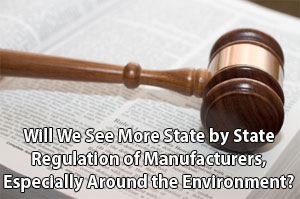But it is in the area of environmental protection where manufacturers are most worried, and find recent action by the new Obama administration as a potential cause for concern.
 In 2007, the Bush administration denied a request by California to impose more restrictive greenhouse gas emissions standards. More than a dozen other states have adopted California's proposed restrictions, which would force automakers to cut emissions by 30 percent in new cars and light trucks by 2016. In 2007, the Bush administration denied a request by California to impose more restrictive greenhouse gas emissions standards. More than a dozen other states have adopted California's proposed restrictions, which would force automakers to cut emissions by 30 percent in new cars and light trucks by 2016.
Now, the Obama administration has agreed to review that decision, and many expect new Environmental Protection Agency chief Lisa Perez Jackson to reverse the Bush ruling.
This means an individual state could have the power to change the way cars sold in its state are designed and engineered. Some fear the precedent could then spill over into other product areas, perhaps trying to regulate carbon emissions or the energy a product use at a state level – a potentially devastating nightmare for manufacturers, whether foreign or domestic.
Keith McCoy, vice president for energy and resources policy at the National Association of Manufacturers, recently said, for example, that, “A separate waiver for California would lead to a patchwork of greenhouse gas reduction laws when climate change is a global issue and should be addressed on a national level.”
In a recent exchange on a PBS television interview, Mike Dushane, editor of Car and Driver magazine, noted that technological and economic obstacles make it difficult, if not impossible, for the auto manufacturers to develop a fleet of vehicles that can meet California’s standards while producing cars that are also affordable and wanted by consumers.
The reality is that most companies, cars makers or others, could not afford to produce custom products at a state-by-state level, and would likely try to find the lowest common denominator by incorporating all requirements, assuming they are compatible, in a single product.
But the cost to consumers could be very high.
Are you in favor of letting individual states set rules on manufacturers relative to environmental or safety/quality issues? Why or why not? Could manufacturers really survive that kind of environment? Let us know your thoughts at the Feedback button below.
|